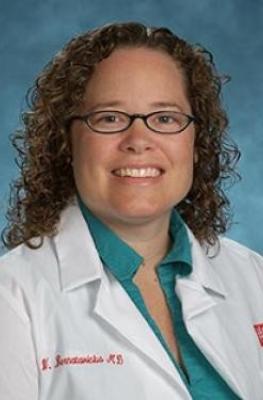Researcher Spotlights
We are changing the landscape of healthcare every day.
Each month, Phoenix Children’s Research spotlights leading physicians and other clinical leaders for their work in the areas of Research, Education and/or Advocacy. For the month of May, we are spotlighting Ashish Patel, MD, for his work in the field of Research and Wendy Bernatavicius, MD, for her contributions to Education and Advocacy.
Ashish S. Patel, MD
Ashish S. Patel, MD, is the Division Chief of Pediatric Gastroenterology and Hepatology, and professor of the Department of Child Health at the University of Arizona College of Medicine. Clinically, Dr. Patel focuses on patients with inflammatory bowel disease (IBD) and helps run the multidisciplinary clinic. He is passionate about building robust programs that focus on innovative medical care, clinical and translational research, education and outreach. His areas of expertise include pediatric IBD, at-risk ethnic populations, novel therapeutics and immunology.
Dr. Patel completed his undergraduate studies at Emory University and attended medical school at Texas A&M Health Science Center. He then completed his residency at Texas A&M Health Science Center/Scott & White Hospital where he also served as Chief Resident. During his fellowship, he specialized in pediatric gastroenterology at the University of Texas Southwestern (UTSW) Medical Center in Dallas. Dr. Patel also completed a dedicated fellowship in IBD, awarded through the Crohn’s & Colitis Foundation during his third year of training.
After his medical training, Dr. Patel had the opportunity to establish the pediatric IBD program at Children’s Medical Center – Dallas. In 2006, he developed the Southwestern Pediatric IBD Center from its inception. That same year, Dr. Patel became one of the original center leaders for [what is now known as] the Improve Care Now Network, the largest worldwide quality initiative in pediatrics. As this program grew, it was a key participant in NIH-funded research across the country and developed collaborative programs with adult IBD counterparts. Faculty recruitment included junior basic science faculty studying early onset IBD and clinical faculty who developed multidisciplinary GI and immunology clinics.
Before coming to Phoenix Children’s, Dr. Patel served as the Associate Clinical Director of the Pediatric Gastroenterology Program at UTSW Medical Center from 2019 onward. He also served as Director of the Southwestern Pediatric IBD Center at Children's Medical Center beginning in 2010.
Dr. Patel has served on numerous local and national committees, including the Crohn's & Colitis Foundation of America Leadership Council, the UTSW Faculty Senate, Gastrointestinal Patient Education Physician Champion and many residency and research committees.
Dr. Patel was named Physician of the Year in 2017 at Children’s Medical Center and later in 2018 by the Crohn’s & Colitis Foundation. He was also recognized in 2018 by the Crohn’s & Colitis Foundation for his nearly two decades of service to Camp Oasis, a camp for children with IBD. In 2019, he was honored with the Rosenthal Award for catalyzing improved patient care and support.
Dr. Patel on Research
Crediting his past mentors for opening his eyes to how research can benefit patients, Dr. Patel shared, “I honestly never thought I would be involved in research but was fortunate to have mentors along my journey who exposed me to research, specifically clinical research.”
Dr. Patel said, “Through these interactions, I learned how research had the opportunity to help more than the single patient I was seeing at any given time. Research has the ability to change the way we assess, care and treat patients on a much larger level.”
In his experience, research provided a network of collaborators both across the country and globally. Dr. Patel sees it as a network of like-minded individuals all working together to advance the care of children with IBD.
Actively involved in research, Dr. Patel is currently working on four National Institutes of Health-funded clinical research projects in IBD. He also has a successful record of publications with more than 50 original research publications, clinical guidelines and case reports.
Recent Publications
- Ulcerative colitis mucosal transcriptomes reveal mitochondriopathy and personalized mechanisms underlying disease severity and treatment response
- Prediction of complicated disease course for children newly diagnosed with Crohn's disease: a multicentre inception cohort study
- Adalimumab in pediatric Crohn’s disease
Dr. Patel on Education & Mentoring
Education and mentoring are two things that Dr. Patel is passionate about. He has been fortunate to receive great mentorship and education throughout his career and wants to pay that forward.
“A mentor should have your best interest in mind 100 percent of the time, at times that may mean being critical, but it means at all times being supportive,” said Dr. Patel. For students or residents who may be interested in a career in gastroenterology, his advice is to gain some exposure to the field. Dr. Patel sees gastroenterology as a unique field highlighted by the diversity of pathology and the involvement of many organs that are part of the gastrointestinal tract, in addition to both liver and small bowel transplantation.
Dr. Patel on Advocacy
Advocacy and community outreach are essential to the success of any program. “The Division of Gastroenterology and Hepatology at Phoenix Children’s serves the families and the children they entrust to our care. It is our responsibility to be involved in advocacy and support to help our communities,” Dr. Patel said.
Dr. Patel’s primary advocacy involvement has been with the Crohn’s & Colitis Foundation. As a first-year fellow Dr. Patel’s mentor, John Andersen, MD, took him to Camp Oasis, a camp for children with IBD. For a decade, Dr. Patel served as a camp counselor before transitioning to medical director.
“It has been my honor to serve the camp over the past two decades and honestly one of the things I look forward to eagerly every year. Seeing children outside the traditional medical setting is something I recommend for every pediatric trainee!” Today, Dr. Patel serves on the Crohn’s & Colitis Foundation Board where he continues to advocate for children with this life-long condition.
“As a physician-leader, Dr. Ashish Patel demonstrated empathy, passion and vision undergirded by unwavering integrity. You are fortunate to have him at Phoenix Children’s.” - John Andersen, MD, Professor Emeritus, University of Texas Southwestern Medical Center
Wendy Bernatavicius, MD
Wendy Bernatavicius, MD, Division Chief of Primary, Complex Care and Adolescent Medicine, did not take the traditional path to medical school. Graduating from the University of New Hampshire in 1994, she initially pursued a career in marketing and advertising while working toward her Master of Business Administration at Villanova University. Six years into her business career, she decided to switch paths to medicine. After completing a post-baccalaureate program at the University of Pennsylvania, Dr. Bernatavicius went on to complete her medical school education at Drexel University College of Medicine. She then joined Phoenix Children’s/Maricopa Medical Center’s pediatric internship and residency program, serving as Chief Resident during her last year of training.
When Dr. Bernatavicius accepted a position as a pediatrician in the General Pediatric Clinic at Phoenix Children's in 2008, she brought with her a passion for the care of children with medical complexity. The term medical complexity refers to chronic conditions that cause severe functional limitations, often leading to technology dependence with high health care utilization.
In 2010, Dr. Bernatavicius began working with Hospice of the Valley and then became board certified in hospice and palliative care medicine in 2012. In 2016, Dr. Bernatavicius became Division Chief of Outpatient Pediatrics, and as a rebranding effort meant to better represent the comprehensive work of the clinic, the division underwent a name change and is now known as the Division of Primary, Complex Care and Adolescent Medicine.
One of Dr. Bernatavicius’ greatest pursuits is to develop a standardized program to help patients with medical complexity transition more smoothly into adult medicine. In addition, she has been involved with multiple organizations in Arizona to improve care coordination for children with medical complexity.
As a pediatrician and strong proponent of the importance of vaccines, Dr. Bernatavicius is currently leading Pfizer’s COVID-19 vaccine pediatric study at Phoenix Children’s as a co-investigator. “This vaccine is one of the most studied vaccines in the history of vaccines,” said Dr. Bernatavicius. For her younger patients with medical complexity, she says the vaccine provides an opportunity to help a population that does not have the same resilience as children with generally healthy immune systems.
When Pfizer amended its vaccine protocol to expand enrollment numbers, Phoenix Children’s was invited to be an expansion site. During the past month, Phoenix Children’s has been one of the highest enrolling expansion sites in the country.
“Dr. Bernatavicius is an excellent clinician, and we knew her background and expertise would add great value to this study. She understands the importance of research in children and the impact it can have on the scientific community,” said Ashley Lopez, Director, Clinical Research Operations. “One of her research focuses is to improve care for children with complex medical conditions. She worked on a PCORI grant [Patient-Centered Outcomes Research Institute] to improve care coordination by identifying gaps in clinical care. She performed conferences around the state, including Yuma and Flagstaff, to receive important feedback from key stakeholders, including parents and physicians.”
In her free time, Dr. Bernatavicius enjoys spending time with her husband and daughter, and loves to spend time outside (when it’s not too hot), playing the piano and writing music.
About the Division of Primary, Complex Care and Adolescent Medicine
The Division of Primary, Complex Care and Adolescent Medicine provides compassionate and collaborative primary and complex care for patients from birth to 21 years of age in a comprehensive, family-centered medical home base at Phoenix Children’s, which also serves as the only pediatric training program in the Valley. Many of this program’s graduates have become leaders in the community and across the country, and it is recognized as the standard for excellence and innovation in pediatric health care and the development of future physician leaders. The family is considered the most important part of the child’s health care team, and as a hospital-based academic practice associated with several universities in the Valley, a child’s visit may include medical students and/or physician residents who are supervised by our attending physicians. The priority and commitment to the patients are providing the most up-to-date and innovative health care available.
Information on the COVID-19 vaccine and kids
Pfizer conducting COVID vaccine trial at Phoenix Children's Hospital | 12news.com



